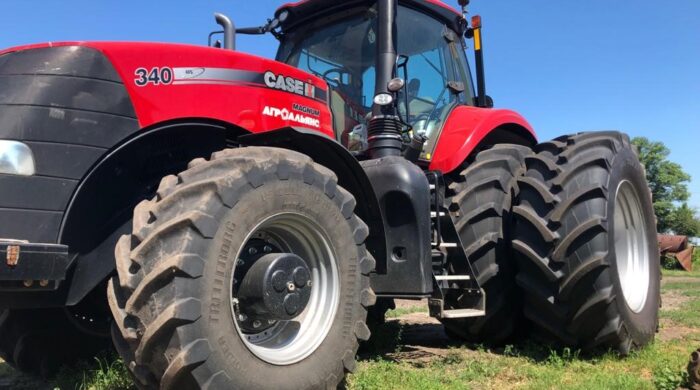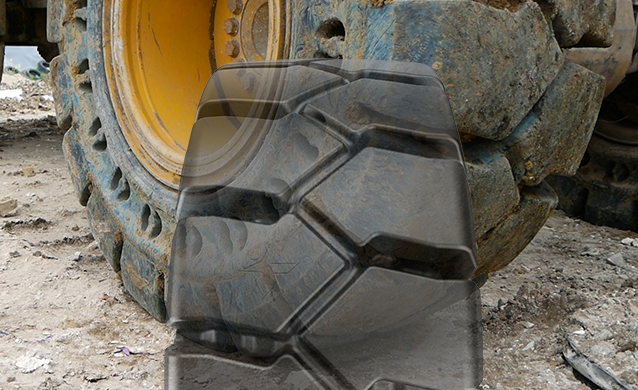
Rubber tires vs. polyurethane comparison
When it comes to selecting whether to use rubber tires or polyurethane tires for your forklift, it’s important to know the attributes and benefits each type of tires offer and how they fit your operations and applications.
Rubber tires are generally used on propane and internal combustion types of forklifts where applications operate both indoor and outdoor. There are also rubber tires that are manufactured for electric forklifts as well with lower rolling resistance for improved battery life. Polyurethane tires, on the other hand, are mainly used on class II and III forklifts and limited to electric lift trucks, where floors are made of smooth concrete.
For a clearer and best comparison, let’s review both types of tires by comparing each tire’s attribute and the benefits.
1. Polyurethane vs. rubber tire on rolling resistance
Designed to go on electric lift trucks, polyurethane tires are manufactured to contain the lowest rolling resistance, resulting in less battery charge time for the application. On the other hand, rubber tires don’t offer as low of rolling resistance in comparison. However, there are rubber tires manufactured for electric forklifts that minimize rolling resistance as well, just not as low as what polyurethane offers.
2. Polyurethane vs. rubber tire on load capacity and ride comfort
Since polyurethane is much harder and contains a higher durometer than rubber tires, polyurethane tires don’t absorb as much impact, allowing them to have higher load capacity than rubber tires. However, a higher durometer means harder tires, resulting in a much stiffer ride. Therefore, if one opts for polyurethane tires for the higher load capacity, the ride comfort will be reduced significantly. There’re rubber tires on the market that offer very high load capacity without compromising ride comfort, however, their durometer won’t match that of a polyurethane tire.
3. Polyurethane vs. rubber tire on load capacity and ride comfort
As mentioned above, rubber tires are lower in durometer or contain less hardness than polyurethane tires, thus rubber tires have softer tread. With a softer tread surface and a broader footprint, rubber tires provide better traction than polyurethane tires. While there are polyurethane tires that contain a siping tread pattern for some traction, rubber tires will usually yield better traction.
4. Polyurethane vs. rubber tire on wear, tear and cut resistance
Polyurethane tires contain higher durometer compared to rubber tires, so overall such hardness will make polyurethane more resistant to cutting and tearing. However, it’s important to ensure cleaner floors in your operations as sharp debris can damage both rubber and polyurethane tires in the long term.
5. Polyurethane vs. rubber tire on speed
Since polyurethane tires don’t dissipate internal heat as well as rubber tires, polyurethane tires should not be equipped on forklifts that run at higher speed. Internal combustion and propane forklifts generally are driven faster than class II and III trucks, making rubber tires a better fit. The general rule is that rubber tires dissipate heat better and hold up in applications that travel at higher speed.
6. Polyurethane vs. rubber tire on floor conditions
Polyurethane tires do not leave any marking on the floor as they usually don’t contain any colorant in the tires. However, non-marking compound rubber tires also don’t mark the floor if one decides rubber tires are a better fit for their application.
If your applications run into wet floor constantly, while some polyurethane tires with siping may offer some traction, rubber tires generally would generally provide better traction on wet floor conditions compared to polyurethane tires.
To conclude the comparison, whether to choose a rubber or a polyurethane tire depends on what attributes a customer requires for their operation. Both types of tires offer their strengths and weaknesses. If a warehouse has a fleet of propane or internal combustion forklifts, rubber tires are the ultimate solutions. If an operation has electric lift class II and III trucks and operates in lower speed, polyurethane tires would make a better choice. Ultimately, it’s also important to practice proper and safe forklift operations and learn how to maintain your forklift tires, maximizing the overall tire life regardless of the types of tires.
For more tire tips and information, contact your local MAXAM Tire sales manager to get best customer service and support you need.



